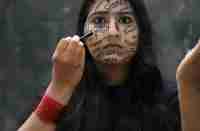How celebrity fixation and parasociality desensitises us
Most of what I know about the personal lives of the British royal family I’ve learned against my will – much in the same way you might know all the words to a pop song you’ve never put on for yourself; even if you’re not going out of your way to come across them, some things are just inescapable.
Public preoccupation with the various comings and goings, virtues and flaws, of the famous relatives is not new. In fact it could be argued the peak of such interest has already come and gone, to suggest coverage during other points in history was more intense. But in any case, fascination with the Windsors certainly endures, and does so at such a level, that if you’re not that interested in them, details about their lives seem to inevitably permeate anyhow.
So much so that I imagine you, the reader, are already well aware of the recent example I am leading into, even if you, like me, don’t opt to pursue information about the royals. I’m referring of course to Kate Middleton and the situation that has surrounded her recently.
#Where(was)Kate?
At the start of 2024, Middleton made a statement saying she’d be undergoing abdominal surgery and taking time afterwards to recover. However, several weeks continued to pass without an appearance from the Princess well after she’d been expected to return, and with no official explanation from the palace, public speculation soon became rampant, with countless posts building under the hashtag #WhereIsKate?.
Only recently did the reason for her absence actually come out; in a video posted March 22nd (her first appearance in months), Middleton revealed she was diagnosed with cancer following her surgery. She thanked those who’d been supportive during this time and said, “We hope that you’ll understand that as a family, we now need some time, space, and privacy while I complete my treatment”.
Middleton’s request to be granted the appropriate privacy and respect is not unexpected – not just because it wouldn’t be an unordinary want for anyone in that situation, but also because of how discourse had been playing out so far.
Conspiracy, speculation… and jokes
Before March 22nd, speculation and indeed wild theorisation about the Princess’s absence had devolved into a frenzy – one far removed from the tenants of privacy and respect Middleton has since requested from the public. Everyone and their mother seemed to have weighed in with their theory, made or laughed along with jokes about the situation, or at least had their interest piqued by the ‘mystery’ of it all, with matters only becoming worse when, in an effort to quell conspiracy, a photo of Middleton with her kids was posted for Mother’s Day… only for the public to quickly realise it’d been photoshopped, prompting a ‘kill order’ to be put out for the picture by some media, bolstering conspiracy further.
The more popular theories suggested affairs on either side of the royal pairing, and/or that Middleton was divorcing her spouse and leaving the royal family entirely. Then there were darker theorists, suggesting she’d been kidnapped, had passed away, or that some malevolent plot had been enacted against her by the palace “just like Diana”.
And then there were the less serious, and often odder suggestions, the jokes/theories that became prolific in the absence of official clarification. I mentioned I don’t keep up to date with the royals, so it was actually through this ‘jokier’ angle I was first exposed to this story at all – with a tweet suggesting Middleton was MIA (missing in action) because she was recovering from a dramatic cosmetic procedure known as a BBL.
Such posts would undoubtedly be hard to go back and read now, given what we’ve learned. In fact, as supportive as people have been since the video, there seems to be a whole lot more retrospectively insensitive remarks from the period of her absence then there are the opposite. And I want to extend a bit of grace, to suppose some commenters didn’t act in bad faith, just got swept up in the buzz – that they wouldn’t have said what they did if they suspected anything serious. But I’m also aware how naïve that may sound; Middleton originally withdrew from the public eye for surgery – it was far from implausible health issues were keeping her from it still.
But perhaps some commenters were only introduced to the news the way I was, and didn’t realise about the surgery and more serious context when they made such jokes. This is the habit of online spaces after all; to muddy important details and background information in favour of promoting whatever details spawn the most engagement, like an unexplained ‘missing’ Princess. And online spaces generally tend towards making light, even when they perhaps shouldn’t.
But we can’t explain away all these responses as social media diluting/misrepresenting things, so what else factored in?
The parasociality to dehumanisation pipeline
We should ask why it was such a news story in the first place that Middleton hadn’t been seen for a few weeks. Sure, being a royal entails certain expectations regarding public interaction and appearances, but beyond these duties, it seems there’s a general societal expectation for all high-profile figures to maintain a constant public presence, and explain themselves if/when they don’t.
This is due in no small part to our increasing fixation on celebrities lives and our parasociality toward them (parasociality meaning when people form one-sided emotional connections with public figures).
Parasociality isn’t inherently harmful; it’s a natural consequence of human psychology and media consumption – especially nowadays with the huge amount of content we consume. But it can quickly become harmful when taken to extremes.
Because as much as it may sound like if you’re fixated on a celebrity, if you relate and feel connected to them, you’d be less inclined to feed into discourse that might be insensitive towards them, the opposite usually ends up being true. People expect their ‘faves’ to be constantly available to them, to divulge any and all information about their private lives. And the constant onslaught of gossip and coverage from media outlets, as well as celebrities’ increased accessibility due to social media, only reinforce this idea that it’s normal to be told every minute detail of a stranger’s life.
As a result, we often end up viewing celebrities not as people, but almost like characters. Characters whose motivations, appearances, and relationships are fair game to pick apart.
Somewhere along the way we’ve grown insensitive. The normalisation of constant, hyper-detailed coverage has served to desensitise us and dehumanise the famous, turn them into objects for entertainment and dismiss the very real struggles they (and indeed other people in our lives who hear us talk about them) could well be facing in secret.
The Middleton situation reminded me of when actor Chadwick Boseman (known for his role as Marvel’s Black Panther) passed away in 2020 after his own battle with cancer. Boseman had chosen not to share this information with the public, even continuing to film during treatment. However, despite ‘doing everything right’ to keep up appearances and appease the public, people noticed he was losing weight and looking ‘worse’ and many began joking about it, mocking and bodyshaming the actor, or demanding he address it in some way.
When Boseman passed and his family confirmed he’d had cancer, there was a turnaround, and people were universally sympathetic. As they were after Middleton’s video. Because people are not monsters. But it shouldn’t have to always get to the point where people are forced to reveal extremely personal and vulnerable information in order to not be endlessly barraged by the public during an already horrific time in their lives.
Boseman’s change in appearance and Middleton’s absence following surgery both bore hallmarks of people suffering with illness who weren’t ready/willing to share that information. Realistically, the reality of both of their situations could’ve been reasonably assumed by the public and due space given, even as a ‘just in case’. But the decision to err on the side of caution is not taken enough, because all too often, our appetite to have every little query about why the status quo for a celebrity has changed is not satiated until it’s spelled out for us in definite terms.
Like mentioned, we’re all guilty of a bit of fixation, and having an interest in a few celebrities is far from inherently harmful. But given how pervasive the constant onslaught of information and speculation about other people’s lives is that it ends up finding us even when we’re not particularly interested in those people, it’s worth considering how our occupation with celebrity affects us, and be wary it doesn’t desensitise us to actual people, actual issues, and the signifiers of them. Maybe then, we will be able to respond better than we do now.






